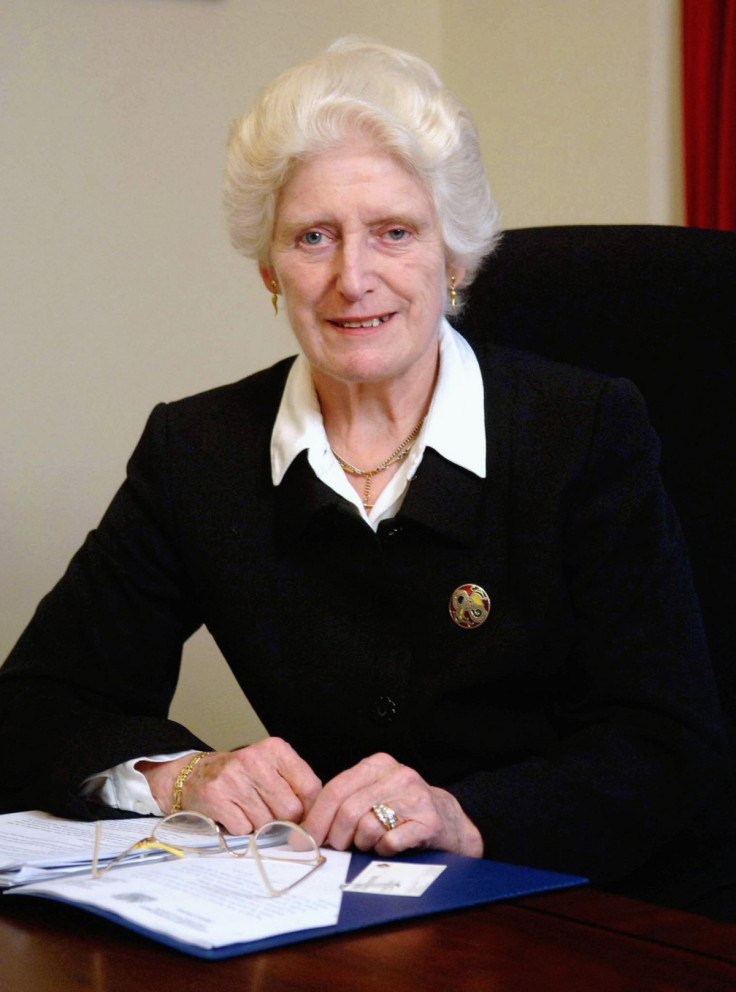Profile: Elizabeth Butler-Sloss the 'Establishment' Figure Heading Child Sex Abuse Inquiry

When ministers announced that Baroness Elizabeth Butler-Sloss was to head the over-arching investigation into child sex abuse in Britain the backlash was swift and loud.
Distinguished and unimpeachable though she is, her brother, former Tory attorney general Sir Michael Havers, had been criticised for not taking action against alleged establishment paedophiles in the 1980s when he was in post.
What surprised many of those MPs leading the demands for an inquiry was that it appeared the prime minister David Cameron and Home Secretary Theresa May had not spotted the potential conflict of interest.
Shadow attorney general, Emily Thornberry, told the BBC: "I don't question this admirable, extraordinary woman's integrity ... but I'm surprised the home office didn't look at this, because I think they have put her in a very difficult position."
There was a very simple reason why the apparent problem was overlooked. It was because the creation of the Hillsborough-style inquiry and appointment of its head had been done in a huge rush in order to get the story off the front pages.
I know my aunt very well. Had she felt any form of bias, or any idea that she shouldn't be doing this inquiry she would have pulled out this morning.
May had been resisting the demands for such a big inquiry right up until the point she was called in to see the prime minister who, in effect, told her to execute a rapid about-face and get on with it before the scandal ran further out of control.
The result was a statement from May announcing the inquiry before any details of who would head it, who would be on the panel and what its terms of reference were could be announced.
The inevitable pressure to announce the inquiry head built, and within a few hours Butler-Sloss had been appointed and the first steps towards driving the inquiry into the very, very long grass (think many years rather than months) was under way.
And then the storm broke. Butler-Sloss was part of the establishment so, once again, the establishment was investigating itself it was claimed.
But worse, her brother had not only failed to take action in the 1980s, he had actually attempted to prevent the naming of a senior diplomat child sex abuser. And the circumstances surrounding that would surely be part of the Butler-Sloss inquiry.
The highly-regarded, 80-year-old retired judge, whose record heading the Cleveland child abuse inquiry in 1987 was widely-praised, said she had been completely unaware of her brother's role in the 1980s.
Her nephew, actor Nigel Havers, quickly came to her defence saying: "I know my aunt very well. Had she felt any form of bias, or any idea that she shouldn't be doing this inquiry she would have pulled out this morning. The very fact she hasn't means to me she feels she has absolutely had no political ties to my father and knew nothing about what was going on in the House of Commons at that time. Therefore she has every right to lead the inquiry."
In many ways, the mother of three Butler-Sloss looks like the ideal candidate to lead such a sensitive, wide-ranging and demanding inquiry.
She was made president of the family division of the high court in 1999 where she remained until her retirement in 2005 and, through her career, she blazed a trail for women in law.
Her father was a high court judge who sentenced to death Ruth Ellis, the last woman to be hanged in Britain.
She has previously admitted that, while not going to university, her family connections probably helped her get into the law. She was called to the bar in 1955 and became a high court judge in 1979 before becoming the first woman appointed to the court of appeal, in 1988.
She previously stood as a Tory election candidate in Vauxhall, but lost. She also set up and ran a nursery for toddlers at a basement in the Temple, one of the Inns of Court.
As head of the controversial Cleveland child abuse inquiry, her findings on protecting children against unnecessary removal from their parents were incorporated into the children act of 1989.
She was made a life peer in 2006 as one of the so-called "people's peers" and the following year started the inquest into the death of Princess Diana but later stood down.
So no one doubts her abilities or integrity, but that is not the point. Perception is everything and at a time when the reputations of politicians, the police are other arms of the establishment are at an all-time low her appointment has already created the public perception that the establishment is once again doing what it does best.
And that does not bode well for the future standing of the child sex abuse inquiry or its eventual findings.
© Copyright IBTimes 2025. All rights reserved.






















